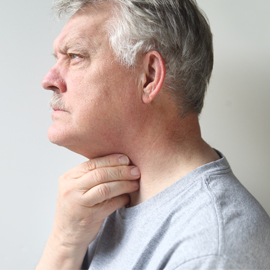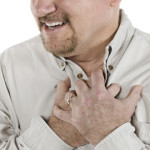
Dysphagia describes a condition in which people have difficulty swallowing. It often occurs in people who have been diagnosed with gastroesophageal reflux disease, or GERD. In most cases, dysphagia occurs when the esophagus becomes damaged from the continual wash of stomach acid that occurs in every episode of GERD.
What causes dysphagia?
The acids in your stomach are potent — strong enough to begin breaking down food into tiny particles so that it can be properly digested. In GERD, those same strong acids are washed up into the lower esophagus again and again, causing irritation, hoarseness and often a sore throat, as well. As time progresses and the esophagus is bathed with acids over and over again, the mucous membrane that lines the esophagus can begin to break down. If GERD is left untreated, the esophageal tissues can eventually become damaged and scarred. In turn, the scar tissue that develops makes the esophagus narrower and less flexible. This is known as an esophageal stricture, and when it occurs, it can make it much more difficult for food to pass into the stomach.
In some patients, the esophageal tissue can undergo striking changes as a result of ongoing and unchecked damage, eventually becoming less like esophageal tissue and more like the tissue that lines your bowels. This condition is called Barrett’s esophagus, and it can make people much more prone to a type of cancer known as esophageal adenocarcinoma.
Symptoms of dysphagia from GERD
The symptoms of dysphagia can vary significantly from one person to another and include:
- Pain when swallowing
- Feeling of food lodged in the throat or upper chest
- Choking
- Coughing
- Hoarseness or sore throat
- Heartburn, characterized by a burning sensation in the chest
- Regurgitation of stomach acids or food particles
- Gagging when trying to swallow
The frequency of symptoms can also vary. Some people may only experience difficulties when swallowing solid foods and no problems swallowing liquids, while others may have the opposite experience. Other people may experience difficulty swallowing any type of food or beverage, and some may even have difficulty swallowing saliva.
Symptoms can also occur more frequently when specific foods are eaten. These foods are called “trigger” foods. Some of the most common trigger foods are:
- Tomato sauce and other tomato-based foods
- Citrus juices, such as orange juice and lemon juice
- Caffeinated beverages, including coffee, tea and soda
- Chocolate
- Fried foods
- Foods high in fat
- Peppermint
- Treatment
The type of treatment that’s best for you will depend on the extent of your condition. In many cases, medication can be used to protect the esophagus and treat symptoms. In some more advanced cases, reflux surgery is the best option to achieve relief and prevent further damage.



